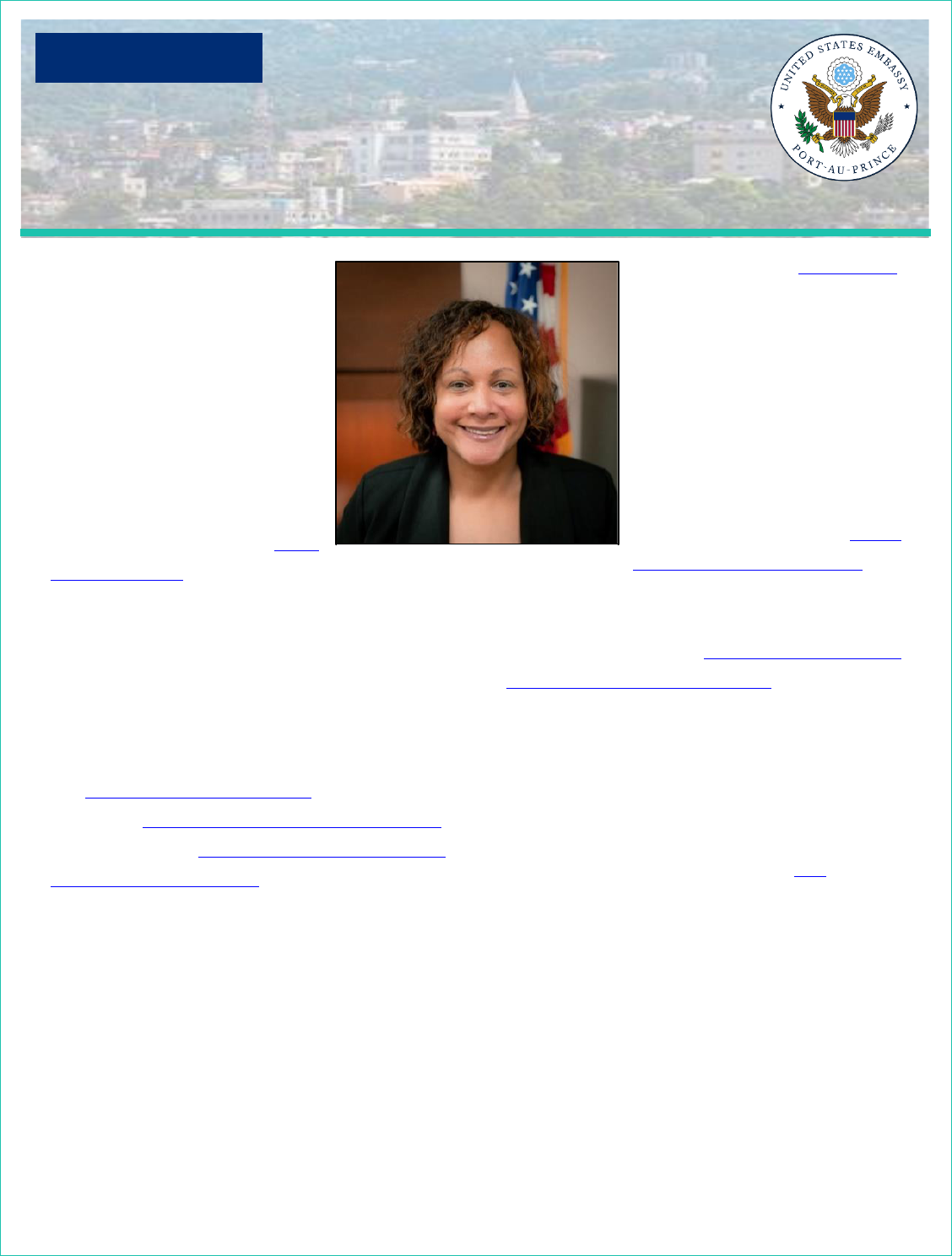
Hello everyone. I’m Cedra Eaton,
the Chief of the American Citizen
Services Unit here at the U.S.
Embassy in Port au Prince.
The welfare and safety of U.S.
citizens abroad is the highest
priority of the Department of
State. The general environment of
insecurity in Haiti is the reason
why the U.S. Government’s travel
advisory for Haiti remains at “Level
4: Do Not Travel” due to
kidnapping, crime, civil unrest, and COVID-19.
The U.S. Embassy in Port au Prince encourages U.S.
citizens to avoid travel to Haiti at this time and
urges U.S. citizens currently in Haiti to depart Haiti
now via commercial means. Please carefully read
our November 10 Security Alert and sign up for
STEP, our Smart Traveler Enrollment Program.
Please also review what the State Department can
and can’t do during a crisis.
Despite the evolving security situation, we are
working diligently each day to continue providing
services to our clients. We thank consular
customers for their patience as we continually
work to serve the public.
For passport renewals, notarial services, and
citizenship claims for children of U.S. citizens born
in Haiti, please book an appointment as early as
possible through our online portal.
If at first you cannot find an
available appointment, please
check back frequently. As your
appointment date nears, please be
prepared with all necessary forms
and documentation so we can
limit wait times and serve clients
more efficiently. Requirements
for passports can be found on the
passport page of our website, and
for Consular Reports of Birth
Abroad, you can find all relevant
application instructions on the child and family
matters/birth page of our website.
President Biden recently announced the United
States’ global air travel policy. Effective November
8, all non-citizen, nonimmigrant airline passengers
traveling to the U.S. must demonstrate proof of
COVID vaccination as defined by the U.S. Centers
for Disease Control and Prevention (CDC) Director
Order prior to boarding a U.S.-bound aircraft.
More details regarding this new global air policy for
both vaccination and pre-travel COVID testing are
available in the “Ask the Consul” section of this
month’s newsletter.
Finally, if you are a current Consular Liaison
Volunteer (CLV) or aspire to join our volunteer
team to help serve U.S. citizens in Haiti, please see
our new CLV Corner with important updates.
November 2021
Consular Newsletter
Pictured: Cedra Eaton,
Chief, American Citizen Services

2
Each month we’ll be answering some of your frequently
asked questions. This month, we’re focusing on the new
vaccine requirements for traveling by air to the United
States.
Q: What is the new vaccine requirement to travel to the
United States?
A: A Presidential Proclamation now requires all adult
foreign national air travelers to the United States, with very
limited exceptions, will be required to be fully vaccinated and to provide proof of vaccination status prior to
boarding an airplane to the United States. Immigrant visa applicants are required to be vaccinated against COVID-
19 as part of the medical exam they receive prior to visa issuance. Please see the CDC website for all the
requirements.
Q: What are the changes for U.S. citizens and Lawful Permanent Residents (LPRs)?
A: Previously, all U.S. citizen and LPR travelers were required to produce a negative test result within three days of travel
to the United States. This requirement remains the same for U.S. citizens and LPRs who can show they are fully
vaccinated. All fully vaccinated U.S. citizens and LPRs traveling to the United States should be prepared to present
documentation of their vaccine status alongside their negative test result.
Those U.S. citizens and LPRs who cannot demonstrate proof of full vaccination will now have to show documentation of
a negative test from a sample taken within one day of departure to the United States.
Q: I’m an American citizen and fully vaccinated – what do I need?
A: If you are fully vaccinated, you will need to show proof of vaccination and a negative COVID-19 test result taken no
more than three days before travel.
Q: I’m an American citizen and not fully vaccinated – what do I need?
A: If you are an American citizen but are not fully vaccinated against COVID-19, then you are required to show a negative
COVID-19 test result taken no more than one day before travel, or documentation of recovery from COVID-10 before
you board your flight to the United States. The CDC warns, “do not travel internationally until you are fully vaccinated.”
Q: Which vaccines will be accepted?
A: The CDC determined that for purposes of travel to the United States, accepted vaccines include FDA approved or
authorized vaccines and WHO emergency use listed (EUL) vaccines. See the list of accepted vaccines here.
Q: What are the testing requirements for children?
A: Children between the ages of 2 and 17 are required to take a pre-departure test. While children under two years of
age are excepted from the testing requirement, CDC recommends a pre-departure test whenever possible.
Q: Where can I get vaccinated in Haiti?
A: There are vaccines available in Haiti for U.S. citizens to receive.
Currently, the Moderna vaccine is available in Haiti. Please visit the
U.S. Embassy COVID-19 Information page for a list of vaccine facilities
in Haiti.
Ask the Consul: Vaccine Requirements Travel
For more information, visit:
• Vaccination Requirements
• U.S. Embassy COVID Page
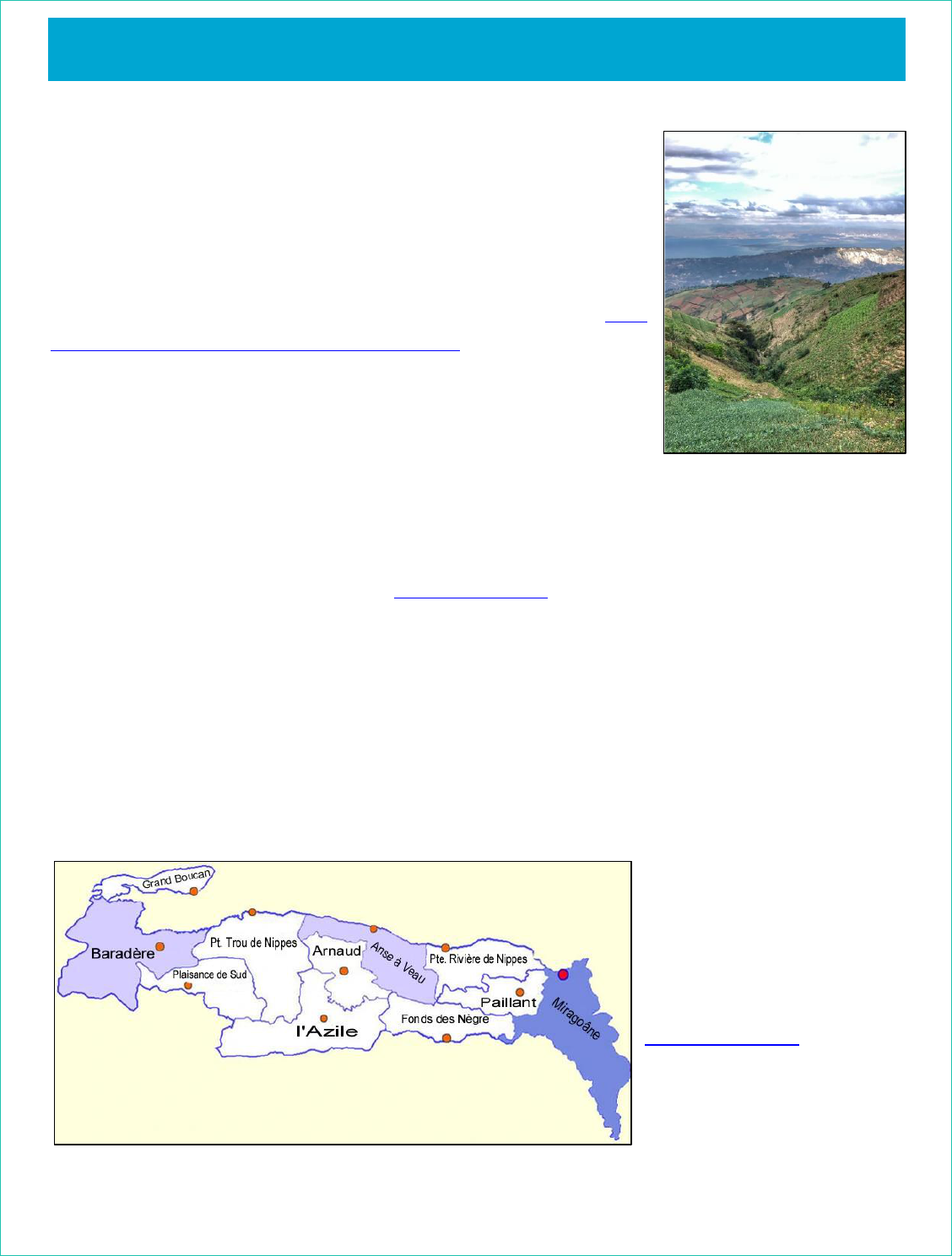
3
Citizen Liaison Volunteers Town Hall Summary
Thank you to all the Citizen Liaison Volunteers (CLVs) who attended the
November 19 virtual Town Hall. Our CLVs help liaise between the Embassy
and U.S. citizens residing throughout Haiti, especially during times of crisis
and emergency.
The Town Hall’s primary focus was to discuss what services the State
Department can and cannot provide during a crisis. For example, the U.S.
Embassy cannot help with in-country transportation, provide personal
protection, nor pay citizens’ travel or medical bills.
We also reiterated that if U.S. citizens choose to remain in Haiti, they
should have an evacuation plan that does not rely on the services of the
U.S. government. We recommend those citizens who choose to remain in Haiti ensure they have up-to-
date travel and legal documents, purchase travel insurance, and discuss a plan with loved ones in case of
emergencies.
For CLV-related inquiries, please contact: [email protected].
Opportunity for American Citizens in Nippes & Les Cayes
The U.S. Embassy's Citizen Liaison Volunteer (CLV) program is looking for U.S. citizen volunteers residing
in Nippes Department and Les Cayes to help us cover these areas of Haiti. CLVs are responsible for alerting
citizens in their area of any important security updates and assisting the Embassy in communicating with
citizens during crisis situations.
We currently do not have any
volunteers in the Nippes
Department and are looking for
U.S. citizens residing in this area.
If interested, please email
[email protected] at your
earliest convenience. Thank
you for considering joining the
CLV team!
Citizen Liaison Volunteer (CLV) Corner

4
November is National Adoption Month! Intercountry adoption is one of the Department’s highest
priorities. Each year, thousands of U.S. citizens adopt children from abroad, and families habitually
resident in other countries also adopt children from the United States. President Joseph R. Biden Jr. gave
the following remarks in the White House Proclamation on National Adoption Month, 2021:
“Every child deserves to grow up with a safe and
loving family, with the care and support of their
community. During National Adoption Month,
we celebrate all of the children and families
nurtured, enriched, and made whole by
adoption and recommit ourselves to ensuring
that every child in America can grow up in a
loving and supportive home.
“The COVID-19 pandemic has made it especially challenging for children in the foster care system. For
thousands of young people in foster care, navigating the challenges of growing up can be especially
difficult without stable family connections. Because of the added difficulties imposed by the pandemic,
my Administration has implemented the substantial investments made through the Supporting Foster
Youth and Families Through the Pandemic Act to help older adolescents transitioning from the foster care
system maintain housing, stay in school, pay the bills, and lay a strong foundation for adulthood. My
Administration encourages States to continue using these available funds to support older foster youth in
every way they can.
“During this month, we also acknowledge the history of injustices and racial bias in our Nation’s child
welfare system. To this day, Black and Native American children are more likely to be removed from their
homes, more likely to stay in care longer, and less likely to be adopted than white children. To ensure the
equal dignity and care of all our children, we must improve our efforts to keep families together, prevent
the trauma of unnecessary child removal, and recruit and support new adoptive families — especially
kinship caregivers. Finally, we must further support families who have already taken youth into their
homes and invest the time and energy needed to ensure that all children — including LGBTQ+ youth
whose needs are not always met in the foster care system — can find the happiness and well-being that
every child and young person deserves.”
You can mark this month by taking a moment to learn more about adopting from the United States and
intercountry adoption.
November: National Adoption Month
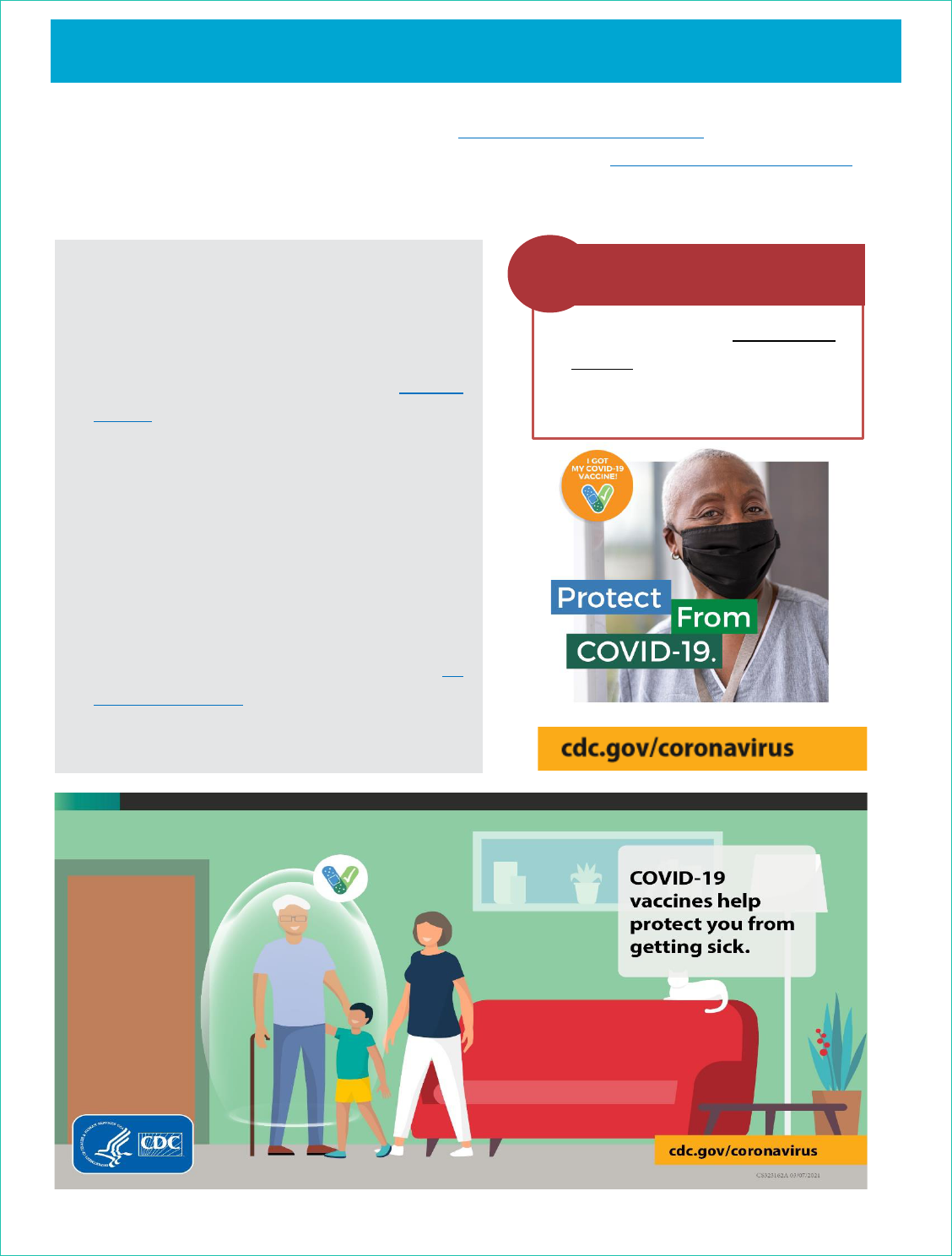
5
COVID-19: For updated information about COVID-19 in Haiti, including where to get vaccinated, where to get tested,
entry/exit requirements, and quarantine information, please visit the Embassy website. The COVID-19 vaccine is
currently available in Haiti at more than 50 locations, in various cities. The requirements for traveling by air to the
United States have recently changed. Please continue to follow host country developments and guidelines for
COVID-19 vaccination.
Health Resources & COVID-19
Additional health guidance:
Make sure you are current on your vaccines,
including tetanus and rabies.
Know where doctors and the closest emergency
room are in your area. Please visit the Embassy
website for a list of hospitals and medical
professionals in Haiti.
Always keep basic medications and supplies on
hand. Invest in a quality first aid kit and keep one
in your car and at home.
Always have medical insurance, including
medevac insurance. If you need to be medically
evacuated out of Haiti, you should contact a
medevac company or an air ambulance service.
Visit the U.S. Embassy website for a list of Air
Ambulance Services.
Haiti – Level 4:
Very High Level of COVID-19
4
The CDC has issued a Level 4 health
advisory for Haiti. Avoid travel to
Haiti. If you must travel to Haiti,
make sure you are fully vaccinated.
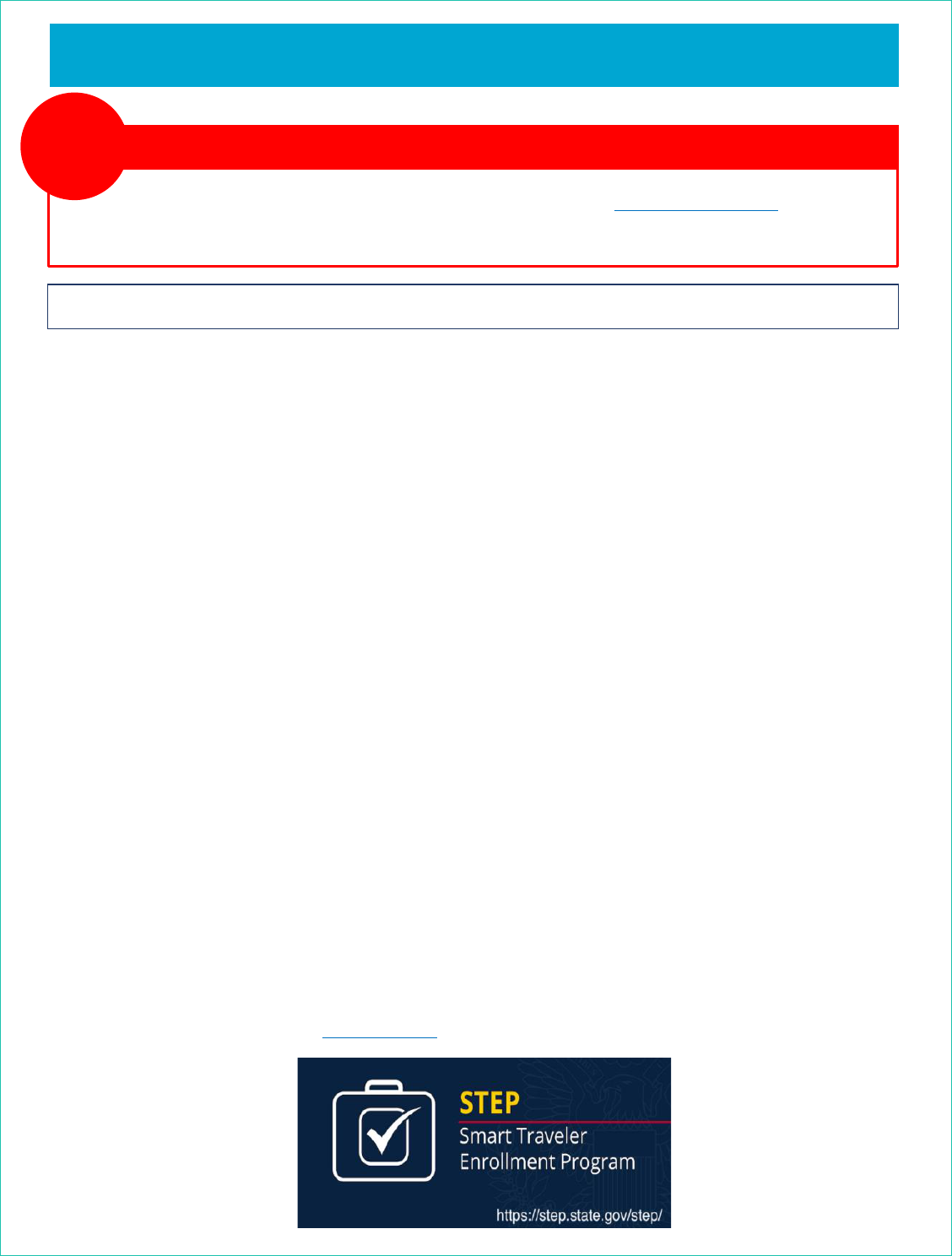
6
If you are in Haiti…
Haiti – Level 4: Do Not Travel
4
The U.S. Department of State has renewed the highest level “Level 4: Do Not Travel”
travel advisory for Haiti due to kidnapping, crime, and civil unrest, and COVID-19.
• Remember that demonstrations, tire burning, and roadblocks are frequent, unpredictable, and can
turn violent at any time. Emergency response, including ambulance service, is limited or non-
existent.
• Always carry your cell phone and ensure it is charged before you travel. Ensure you have important
numbers programmed into your phone. Consider using code names for family or friends.
• Avoid demonstrations and crowds. If you encounter a roadblock, turn around and get to a safe
area.
• Arrange airport transfers and hotels in advance, or have your host meet you upon arrival.
• Travel by vehicle to minimize walking in public, and travel in groups of at least two people,
whenever possible.
• Always keep vehicle doors and windows locked, with valuables out of sight.
• Exercise caution and alertness, especially when driving through markets and other traffic-
congested areas.
• Do not physically resist any robbery attempt/kidnapping.
• Do not travel in areas unfamiliar to you and be aware that navigation apps are highly unreliable in
Haiti.
• Always make sure your vehicle is in good driving condition.
• Travel at times when traffic is expected to be lighter and avoid travel after dark in Port au Prince.
• Ensure adequate spacing between vehicles to provide options for evading a potentially dangerous
situation.
• Patronize shops or restaurants that provide secure, enclosed, and well-lit parking.
• Always inform someone, such as a family member or friend, of where you are going and what time
you expect to return. Minimize broadly publishing your travel plans on social media.
• Enroll in the Smart Traveler Enrollment Program (STEP) to receive important information from the
Embassy about safety conditions in Haiti, and help the Embassy contact you in the case of
emergency. To enroll, visit: step.state.gov, or click the image below.
Travel & Security
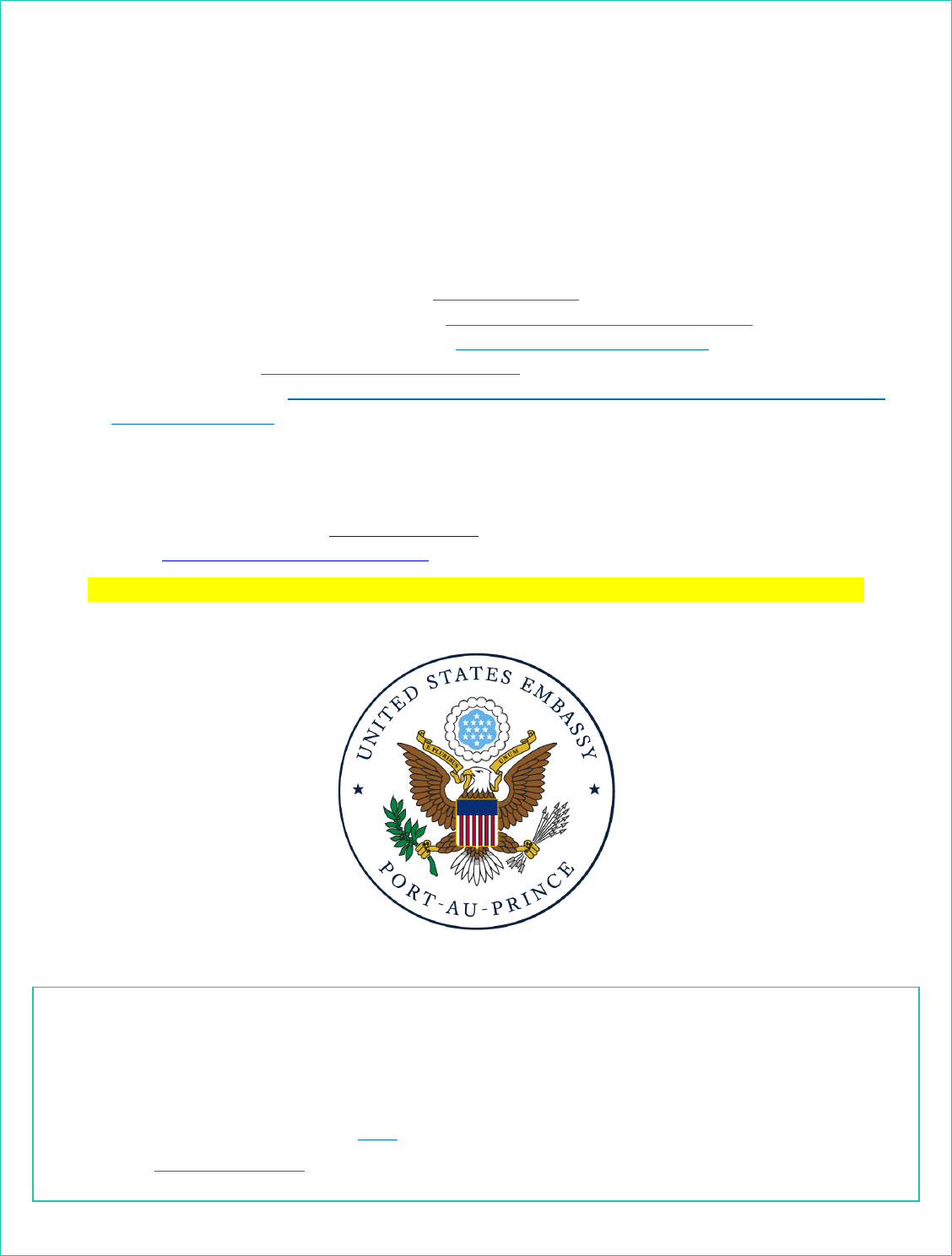
7
CONTACT INFORMATION
Embassy Address:
U.S. Embassy Port au Prince
Boulevard du 15 Octobre
Tabarre 41, Route de Tabarre, Port au Prince, Haiti
Online Resources:
✓ U.S. Embassy Port au Prince’s website: ht.usembassy.gov
✓ American Citizen Services (ACS) website: ht.usembassy.gov/u-s-citizen-services
✓ U.S. Embassy Port au Prince on Facebook: facebook.com/USEmbassyHaiti
✓ ACS on Facebook: facebook.com/ACSPortauPrince
✓ Haiti Travel Advisory: travel.state.gov/content/travel/en/traveladvisories/traveladvisories/haiti-
travel-advisory.html
To respond to your inquiry most effectively, we strongly encourage you to write to our topic-specific e-
mail addresses as follows:
✓ American Citizen Services: [email protected]
✓ Visas: [email protected]
In case of a life or death emergency regarding U.S. citizens in Haiti, please call: +509-2229-8000
Disclaimer: This newsletter is published by the Consular section of the U.S. Embassy in Port au Prince as a
service for U.S. citizens living or traveling in Haiti. It provides security and other general information to
people who have subscribed by enrolling with the Embassy. Please feel free to pass it along to other
interested people. If you would like to receive your own copy directly, enroll with the Embassy through the
Smart Traveler Enrollment Program (STEP). Comments and suggestions regarding this newsletter are
welcomed at [email protected].
